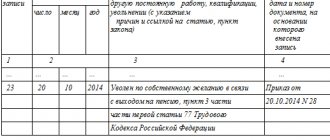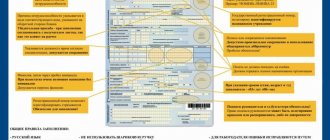An illness or injury does not ask when it will happen, and especially does not take into account the plans of the employer or employees. How to properly combine sick leave and dismissal? Who will pay for sick leave if illness strikes soon after dismissal? What do employers have the right to do if their subordinates take sick leave too often or for long periods of time? Who should work in place of sick employees? We try to clarify all questions in this article.
What is the procedure for voluntary dismissal during sick leave and payment for employee days of incapacity?
Dismissal at the initiative of the employer
An employee, while on sick leave, does not have to fear sudden dismissal - this is clearly prohibited by Article 81 of the Labor Code of the Russian Federation. Vacation and temporary disability guarantee immunity from dismissal on the employer's initiative.
Important! If an employee, warned about the impending dismissal, fell ill shortly before it or even on the planned day of dismissal, it is no longer possible to terminate the employment contract with him. The management will have to wait for recovery and dismiss the employee after the sick leave is closed. All documents related to the dismissal procedure (justification, order, settlement with the employee, entry in the work book) must be drawn up after the dismissed person returns from sick leave.
However, if the company is liquidated, the employer ceases its activities, and all employees, including those on sick leave, will be fired. This is the only exception for dismissal not on the initiative of an ill employee.
What to do if the day of voluntary dismissal fell on sick leave ?
Results
Working off is considered to be the period between the date of filing an application for voluntary dismissal and the date of actual termination of the employment contract. There is no such concept in the law; there is only an employee’s obligation to notify his employer of his upcoming dismissal two weeks before the desired date. Therefore, the norms of the Labor Code of the Russian Federation make it quite clear that sick leave during dismissal does not affect the desired date of entry in the work book.
Sources:
- Labor Code of the Russian Federation
- Federal Law of December 29, 2006 N 255-FZ “On compulsory social insurance in case of temporary disability and in connection with maternity”
- Resolution of the Plenum of the Supreme Court of the Russian Federation dated March 17, 2004 N 2
You can find more complete information on the topic in ConsultantPlus. Free trial access to the system for 2 days.
Dismissal at the initiative of the employee
When the dismissal is initiated by the worker himself by writing a letter of resignation, there is no reason for the employer not to release him from work on the specified day. It happens that after writing an application, an employee becomes ill, or decides to resign during illness. The combination of sick leave and dismissal must occur in accordance with the law.
Question: How to pay for sick leave if, during a period of incapacity for work, an employee is dismissed due to the expiration of a fixed-term employment contract? View answer
- The employee wrote a statement and after some time fell ill.
According to the law, he should work for another 2 weeks, but instead he went on sick leave. What to do with dismissal? The situation can develop in different ways.- The employee will recover before the expiration of 2 weeks, return from sick leave and resign on the planned day.
The employee continues to be ill longer than the time left before dismissal: the order will still be issued on the day specified in the application. The employee’s will is clearly expressed; the employer has no right to change it without written consent. So, the employee will be fired according to his application, and sick leave will be paid upon recovery after dismissal.
- The employee, while on sick leave, withdrew his resignation letter. In this case, the employer will wait for the termination of temporary disability and resolve issues of further cooperation after the closure of the sick leave.
- An employee decided to quit while sick.
An application for dismissal can be submitted at any time, both during vacation and on sick leave, as explained in the letter of Rostrud No. 1551-6 dated 09/05/2006. Naturally, the desired date of dismissal must be 14 days away from the date of filing the application. It does not matter whether the employee has time to recover during this time - the law prescribes termination of the employment relationship on a specified date.If, on the day of dismissal, a sick employee was unable to come to receive his work and pay slip, he must be notified. The employer is obliged to do this so as not to be responsible for the delay in the work book. The work report, with the written permission of the employee, can be sent to him by mail, and the money can be credited to his bank card on time.
NOTE! In most controversial cases, the Labor Code of the Russian Federation protects the interests of employees, which is especially clear in the example of sick leave: the working time is running out, and the person is quietly recovering during this time. The employer does not have the right to extend the two-week work period after leaving sick leave.
Reasons for termination of an employment contract
When applying for a job, a new employee enters into an agreement with the organization, which is regulated by the provisions of the Labor Code of the Russian Federation. Termination of this agreement may occur for various reasons:
- at the request of the employee;
- at the initiative of the employer;
- by agreement of both parties;
- due to circumstances beyond the control of both parties;
- when moving to a new position;
- in case of violation of the rules of the employment contract;
- upon expiration of the contract.
The most convenient option for both parties is mutual consent. In this case, the employee and manager can enter into an agreement that will be beneficial to both. Usually, in this case, the employee receives additional payments, and the employer guarantees that the agreement will not be canceled or challenged due to changed circumstances in the employee’s life.
Dismissal for inadequacy of the position is a rare option, as it is often difficult to prove.
An employee who does not show up for work may subsequently bring sick leave, in which case he will not be counted as absenteeism. Professional unsuitability can only be revealed in the event of a general certification that meets the requirements of the law.
The most common is leaving work of your own free will. Sometimes, even in the case of serious violations, the employer gives the person the opportunity to write a statement on his own so that dismissal under the article is not recorded in the work book.
But more often a person simply finds another, higher-paying, prestigious or convenient vacancy or moves.
Sometimes the reason for dismissal is reluctance to work under new management, unpreparedness for business trips, changes in working conditions, or deteriorating health.
After the written application, a two-week work period follows , but often people try to reduce it or avoid it altogether. Since sick leave is included in service upon dismissal, sometimes it is taken so as not to return to the place of duty. But before making hasty decisions, you need to know how many days you are supposed to work in different situations.
Got sick while looking for a new job
It would seem that after the termination of employment relations with the employer, the health of the former employee is already his own problem. But here, too, the law is on the side of the weaker: for another 30 days, the former employer is obliged to accept for payment the sick leave of the dismissed employee.
The priority is the date of opening the certificate of incapacity for work, and not its duration. Even if a person falls ill on the 29th day after dismissal, he will have to be paid for sick leave, no matter how long the period of illness lasts.
In such cases, compensation will be slightly less - 60% of average earnings (Part 2, Article 7 of Federal Law No. 255).
Naturally, this requirement will be valid only if during the specified month the dismissed person has not yet found another job: otherwise the sick leave will have to be borne by the new employer.
Severance of labor relations
Knowing all the rules that an organization follows when dismissing or severing an employment relationship, you can begin the process by writing a statement. It’s most convenient to use the company’s letterhead, but if you don’t have one, you can write the application by hand. This is done as follows:
- in the upper right corner is indicated the full name, position of the person to whom the application is addressed, and the name of the organization (for example, General Director of Stal LLC Ivanov I.A.), as well as the initials and position of the person wishing to resign (from engineer Kotova M . IN.);
- the title of the document (resignation letter) is written as the title;
- the text of the document itself contains the request, the date of the last working day, special circumstances, if any, and the reason (I ask you to dismiss me at your own request on May 1, 2021, without work due to the transfer of my spouse to a new duty station);
- the document ends with the full initials of its author, personal signature and date (Kotova Marina Vladislavovna, April 30, 2018).
The example considers an application requesting leave without work. If you plan to remain at work for another two weeks, they will be counted from the next day after written notification to the employer.
If the application is written on April 30, the person is completely free from all official obligations on May 15. But the deadlines are observed only when personally transmitting the document to the employer; an oral statement has no legal force, and when sending a letter by mail, the deadlines for delivering the correspondence must be taken into account.
If circumstances change, you can withdraw a previously written application.
If they have not yet managed to invite another person to this position in writing, the employer does not have the right to dismiss someone who has changed their mind from the position .
After reading the application, the manager issues an order indicating the full name of the person being dismissed, his personnel number, position and name of the unit, date and reason for leaving, and a link to the Labor Code. After the employee signs the order, the HR department will prepare a work book, and the accountant will make the accruals.
The full calculation contains payment for the entire period worked, required compensation, incentive payments, if any. Compensation most often includes payment for vacation that the employee did not have time to take. But if he was taken off work ahead of time and had to be worked off, the employee, on the contrary, will be withheld the amount owed.
The payment must be received on time, even if the person is on sick leave at that time. In case of long delays, the organization is obliged to pay a penalty. The certificate of incapacity for work will be paid after its closure, on the next day or on the nearest day of payment of salary or advance payment.
Thus, if you intend to quit, you need to carefully weigh the pros and cons and remember that this decision cannot always be reversed. If you are completely sure of the need for care, you need to know that no one will be able to keep an employee at work for more than 14 days, and sick leave is counted as working time upon dismissal. But the employer will be forced to wait until his subordinate’s certificate of incapacity for work expires, regardless of the date for which the layoff was planned.
Legal deadlines
An employee may bring sick leave for payment not immediately, but within six months from the date of recovery. It does not matter in what period he was fired: before the illness, during it or after it. Even if the sheet was opened some time after dismissal (up to 30 days), then within 6 months after recovery the former employee has the right to apply for temporary disability benefits (Part 1, Article 12 of the Federal Law of December 29, 2006)
IMPORTANT INFORMATION! Since 2015, disability benefits for more than 3 days have been paid from the Social Insurance Fund, so employers have fewer and fewer reasons to evade legal payments.
Benefit payments must be scheduled no later than 10 days upon presentation of the slip, and payment for them will be made on the next payday.
A regular sick leave certificate is issued for up to 30 days. If you fail to recover during this time, an extension is possible based on the results of a special medical commission. If there is no conclusion about professional incompetence (that is, after recovery it will be possible to return to your previous job), sick leave can be extended to a maximum of 10 months.
An employee is sick, who should work?
If the business suffers significantly from the absence of an employee, then someone must perform the functions of the absentee. What is it permissible for an employer to do, since it is not yet possible to fire an employee:
- temporarily assign the sick person’s responsibilities to other employees with appropriate qualifications (through external part-time work or combination of positions, with the drawing up of an additional agreement to the employment contract);
- hire another employee by concluding a fixed-term employment contract with him, in which the wording “until the permanent employee leaves sick leave” must be entered.
When sick days are endless
Weak health or malingering workers, or perhaps a mother with a frequently ill baby, are too often and for long periods of time unable to work? This situation is extremely unprofitable for the employer, despite the fact that sick leave is not paid out of his pocket. The Labor Code does not allow dismissal due to frequent sick leave, but employers in practice create such conditions for such employees upon returning to work that it is easier for someone who takes sick leave to resign at their own request or by agreement of the parties. You can understand them: they need employees, not sick leave.
What can an employer do legally if an employee is absent for too long and often due to illness?
- If continuous sick leave lasts 3 months, then on the basis of clause 3 of Art. 81 of the Labor Code this means the employee’s professional incompetence, unless there is a different conclusion from the medical commission, which must be passed to extend sick leave for more than 1 month. In this case, the employer must offer the employee another position that is more suitable for his health. If there is no vacant position with the proper qualifications or the employee does not agree to it, dismissal will be absolutely lawful.
- You need to pay attention to the institution that issued the certificates of incapacity for work. It may not have such rights. An employee cannot provide sick leave issued:
- sanatoriums;
- mud baths;
- donor center;
- emergency care;
- medical examiner's office.
- You can check whether the employee provided real sick leave. To do this, you need to send a request to the medical institution about the officialness of the issued sick leave. The information is not a secret, and the answer will be received. If sick leave was not issued to this person within the specified period, there is absenteeism and a peremptory reason for dismissal. If the sick leave is legal, you can offer the employee to undergo an extraordinary medical examination to determine further professional suitability.
Thus, if the initiative to quit comes from the employee, then there are no obstacles preventing him from ending his career in this company. If the employer is not satisfied with the quality of the work being performed, he will have to find arguments and evidence to vacate the workplace. Most often, the Labor Code of the Russian Federation is on the side of the employee rather than the employer.
What is the reason for leaving?
The general grounds for termination of an employment contract are specified in Art. 77 Labor Code of the Russian Federation. Leaving may occur:
- at the initiative of the employee (Article 80);
- on the initiative of the authorities (Article 71 and Article 81);
- by agreement of the parties (Article 78);
- upon expiration of the agreement (Article 79);
- due to transfer to another organization (Article 72.1);
- due to the employee’s refusal to work after the arrival of the new owner (Article 75);
- when the terms of the contract are changed (Article 74);
- due to the employee’s refusal to take another position for medical reasons (Article 73).
Dismissal can also occur under other circumstances, for example, due to conscription into the army (Article 83). The basis for termination of the contract may be its conclusion in violation of the requirements of the law, for example, with a disqualified person (Article 84). The grounds for dismissal must be recorded in the work book and order.








